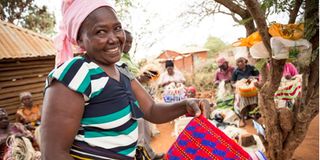Kenya’s gender equality allocation stuck at 0.3 per cent

Women weaving baskets at Tutini Village in Makueni County. Gender advocates have raised concerns over State's low funding of women's activities in the country.
What you need to know:
- Publish What You Fund has tracked gender financing in Kenya for three consecutive financial years since 2018/19.
- While the total annual budget expands, gender equality allocation is static at 0.3 per cent.
- Funding for women’s rights work has been reducing, yet the amount of work is huge especially on sexual and reproductive health, women’s participation in agriculture and women with disabilities.
Kenya has spent a mere 0.3 per cent on gender equality in the past three fiscal years.
This allocation could, however, rise should there be synergic efforts towards advocating for accountability from funders and receivers, including the national and county governments as well as women’s rights organisations.
This came out during a recent virtual forum titled How transparent is gender equality funding in Kenya and where do we go from here? organised by Publish What You Fund, a global organisation that campaigns for aid transparency.
The organisation has tracked gender financing in Kenya for the three consecutive financial years since 2018/19 and while the total annual budget expands, gender equality allocation is static at 0.3 per cent.
For instance, in 2019/20 out of the $25 billion budget, the national government allocated only $72m, an increase by just a $1 million from the previous fiscal year. Kenya’s 2018/19 total budget was similarly $25 billion.
While in 2020/21, it maintained the similar ceiling with an $81 million allocation out of an annual budget of $31 billion, equivalent to a sheer 0.3 per cent.
The 0.3 per cent is the total traceable gender equality funding for national ministries, departments and agencies (MDAs) that run gender equality programs namely National Gender and Equality Commission (NGEC), State Department for Gender, Kenya National Commission on Human Rights and Ministry of Health, mainly reproductive and maternal healthcare.
“However, many MDAs do not signpost their budget allocations as GRB (Gender responsive budgeting), nor do they say how their funds support the National Policy on Gender and Development. As a result, it is difficult to paint a comprehensive picture of government funding that supports Kenya’s gender equality commitments,” states the Publish What You Fund 2021 report on Gender Financing in Kenya: Mapping funding to improve gender equality.
During the meeting, Publish What You Fund, Gender Project Management and Research Officer Ms Jamie Holton, said: “There is a lot of disaggregated information, which makes it difficult to say how the Kenyan government is funding its national gender policies.”
She proposed that development partners support gender equality advocates in Kenya to push for a change in the gender financing system in the country.
Kenya Female Advisory Organisation (Kefeado), Executive Director Ms Easter Okech, raised concern that financing for gender equality work is thinning.
“The funding for women’s rights work has been reducing for years, yet the amount of work is huge especially on issues such as sexual and reproductive health, women’s participation in agriculture and women with disabilities,” she said.
She, however, noted the importance of women’s rights organisations proving the impact of their work. This she said could draw more investments into gender equality work.
NGEC Director of Programs and Research Mr Paul Kuria, said the data on the measly gender financing in Kenya is a wakeup call to stakeholders including citizens, MDAs and women’s rights organisations to champion for reforms in the resource allocation.
“Gender financing infrastructure requires a total reform. We need more innovations… more transformations so that we move away from just providing resources without remaining accountable,” he said.
US Agency for International Development (USAid) Gender and Inclusivity Specialist Ms Betty Mugo, said accountability is pivotal to guaranteeing investments in gender equality work
“Without data it is difficult to hold each other accountable. But holding each other accountable is an important part in how we prioritise gender equality work and investments,” she said.
Globally, underfunding or lack of funding for gender equality programs is a major problem that is even troubling the United Nations (UN).
During the annual UN Security Council Open Debate on Women, Peace and Security in October last year, UN Secretary-General Mr António Guterres was emphatic on changing tact in supporting attainment of women and girls’ rights.
For instance, he noted that a paltry 0.2 per cent of bilateral aid to fragile and conflict-affected countries goes to women’s rights organisations, yet they support local women’s peace initiatives.
UN Women is now pushing for adoption of gender bonds, which are issued by investors interested in advancing gender equality, and the proceeds are used to finance the respective work.
The challenge, however, is exciting investors with the gender bonds proposition to secure their financial investments.





